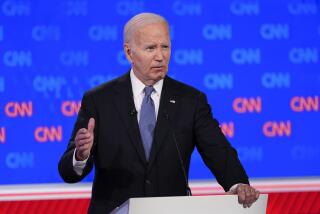‘Determined, Frustrated’ : Crisis Demeanor: Reagan Changes, but Only a Little
- Share via
WASHINGTON — It is 9:12 a.m. on June 26, the 13th day of the Lebanese hostage crisis, and President Reagan is walking along a colonnade bordering the Rose Garden on his way to the Oval Office.
He is 12 minutes late, having spent more time than planned in the White House family dining room, talking about taxes with Republican members of the House Ways and Means Committee. The subject of the American hostages in Lebanon--dominating the headlines and riveting the attention of the nation--was raised only once, in passing, by one guest.
Now, about to meet with staff members and receive his morning update on developments in Beirut, where it is already late afternoon, the President is accompanied by Lucky, his 9-month-old black herding dog. On the way, he pauses for the continuing task of teaching the puppy to heel.
Tempers have flared elsewhere in the White House. One source close to several White House staff members recalls some “heated arguments, screaming, . . . a lot of arguing” in the offices of the President’s national security staff.
But according to Reagan’s aides and others who have visited with him, the President’s own demeanor has barely wavered.
Yes, he has conceded, his inability to bring the crisis to a quick and peaceful conclusion has been frustrating. As he said at a June 18 news conference, when the crisis was in its fifth day, “I’ve pounded a few walls myself when I’m alone about this.”
But at the same time, he has conducted the wide range of business of the modern presidency. There have been meetings on his proposal to revise the federal income tax structure. A brief chat with race driver Richard Petty, who donated one of his cars to the Smithsonian Institution. A talk to teachers seeking a ride on the space shuttle. Speeches out of town. An evening visit to the home of Sen. Edward M. Kennedy (D-Mass.). And more meetings on taxes.
It’s almost the same Reagan seen in better times--but not quite.
“He is not as jocular as he has been,” said one former aide who has maintained close contacts with those at the White House. “Not grim, but determined. Frustrated. He is very determined . . . to work this thing out.”
There have been moments when the 74-year-old President has seemed, in the words of one visitor, “a little sleepy.” To another guest, he looked, “as always, disgustingly healthy.”
The hostage crisis has not produced the deep tragedy of the bombing of the Marine Corps barracks in Beirut on Oct. 23, 1983, or the tension that accompanied the invasion of Grenada two days later. But unlike those precisely defined events, this one drags on, day in and day out, into the longest-running publicly played crisis of Reagan’s 53 months in office.
The bombing of the barracks, which cost the lives of 241 U.S. servicemen, was “a long downer” for the President, said one close friend of the Reagans, although “he’s not a man who has deep depressions.”
“This is not at that stage yet,” the source said. “He has a buoyant personality, and he knows life goes on.”
Not ‘Consumed By It’
Rep. Richard Cheney (R-Wyo.), who was chief of Gerald R. Ford’s White House staff 10 years ago and has attended White House meetings this week at which Reagan has presided, said the hostage crisis “is obviously an important item that dominates the current agenda internally, but (Reagan) doesn’t appear to be consumed by it.”
At one meeting, Reagan routinely called on senior aides and advisers--national security adviser Robert C. McFarlane, Treasury Secretary James A. Baker III, Budget Director David A. Stockman--to give congressional leaders summaries of current issues: the hostages, tax revision, the budget. Cheney said Reagan presided over a luncheon of chilled soup and medallions of beef while “he called on his guys to make their pitches.”
At the tax meeting Wednesday morning with the Ways and Means Committee members, participants said there was little hint in the President’s demeanor that he had anything else on his mind.
Indeed, Rep. Bill Frenzel (R-Minn.) recalled several hours later that, as he walked from the meeting, his own thoughts turned to the crisis in Lebanon and its exclusion at the just-concluded session with the President. He said to himself, “My God, I never even thought about it once.”
More to Read
Get the L.A. Times Politics newsletter
Deeply reported insights into legislation, politics and policy from Sacramento, Washington and beyond. In your inbox twice per week.
You may occasionally receive promotional content from the Los Angeles Times.










